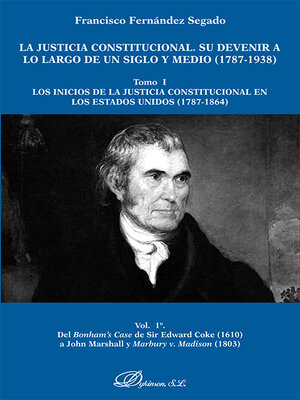La justicia constitucional. Su devenir a lo largo de un siglo y medio (1787-1938), Tomo I: Los inicios de la justicia constitucional en los Estados Unidos (1787-1864), Vol. 1º.
ebook ∣ Del Bonham's Case de Sir Edward Coke (1610) a John Marshall y Marbury v. Madison (1803)
By Francisco Fernández Segado

Sign up to save your library
With an OverDrive account, you can save your favorite libraries for at-a-glance information about availability. Find out more about OverDrive accounts.
Find this title in Libby, the library reading app by OverDrive.



Search for a digital library with this title
Title found at these libraries:
| Library Name | Distance |
|---|---|
| Loading... |
The work "La Justicia Constitucional. Su devenir a lo largo de un siglo y medio (1787-1938)", through four extensive volumes, aims to carefully study the evolution of constitutional justice in the century and a half that has elapsed since the North American Constitution of 1787 until 1938, the Austrian Constitutional Court's last year of operation, given that, in 1938, following the invasion of Austria by Nazi troops, the Austrian Federal Republic ceased to exist, and with it, obviously, the Constitutional Court, an institution whose paternity must be attributed to Kelsen.The first volume of this work focuses on North America, with a time frame between 1787 and 1864, the year of the death of the Chief Justice of the Supreme Court Roger Brooke Taney, whose Court, like the one that preceded him under the Chief Justiceship of John Marshall, declared a federal law unconstitutional. Although the transcendental question of whether the Federal Convention of Philadelphia recognized judicial review, that is, the judicial power to control the constitutionality of laws, it has been, and still is today, highly controversial by American doctrine. For our part, we are inclined to think, in line, among many other authors, with the great Harvard Professor James B. Thayer, that in the aforementioned Constitutional Convention it was admitted that the courts had the power to disapply a law to the case before them because of its unconstitutionality.In this first volume, of course, we devote a preliminary chapter to the various historical precedents of judicial review of the constitutionality of laws, paying particular attention to the figure of that great English judge who was Lord Edward Coke and the famous Bonham's case (1610), which would have such a great impact on the English colonies in America, also taking into account the review of colonial legislation carried out by the Privy Council and its occasional application of the ultra vires principle. The figure of James Otis and his intervention in the transcendental Writs of assistance case (1761) also deserves very particular attention.In the following chapter, after analysing the first cases of exercise of judicial review by state courts, we pay close attention to the Constitutional Convention in Philadelphia and its position before judicial review, after which we go on to analyse in some detail the discussion that arose in some state Conventions for ratification of the Federal Constitution, very particularly in the New York Convention, which led to criticism of the Constitution of the anti-federalist Brutus and the replies of Alexander Hamilton in The Federalist Papers. This chapter closes with the analysis of the Judiciary Act of 1789.The third chapter examines in some detail the future of the judicial review in what is usually identified as the pre-Marshall Court (1789-1801), taking a look at some of the most relevant cases from the litigation arising from the Invalid Pension Acts (1792 and 1794) to Cooper v. Telfair (1800), without forgetting the exercise of judicial review by some state courts. The study of the Federalist Alien and Sedition Acts (1798) and the disproportionate Republican reaction to those laws, reflected in the Virginia and Kentucky Resolutions, closes this chapter.The two subsequent chapters focus their attention on the Marshall Court (1801-1835), successively analysing the background of the Marbury opinion (chapter four), which we believe is essential for a better understanding of the Marbury v. Madison case, the judgment itself, to which we dedicate extensive attention, with the study, among other aspects, of the two argumentative blocks, the different critical considerations raised by John Marshall's argument, an...







